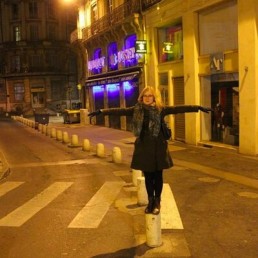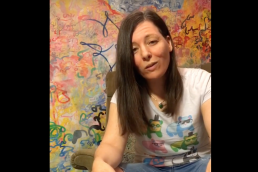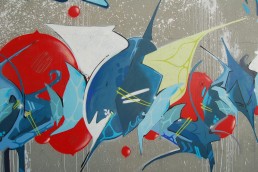by Rowan Lyster
SPLIT, VAULT Festival 28 Feb → 4 March, 2018
The first thing to say about Tamar Broadbent and Emma Pritchard’s Split is that it’s bloody funny. The second thing to say is that the Network Theatre, situated in an ominous car park in the bowels of Waterloo station, is very well-hidden.
Sprinting into a venue in the nick of time is never a good look, but Split was the perfect antidote to a stressful journey. It centres on the friendship of two girls through their teen years, inviting the audience to make comparisons with romantic relationships whilst leaving the menfolk out of the picture. It’s joyous to see an all-female team credited, and perhaps because of this, the production avoids the classic Hollywood trap by which tales of ‘female friendship’ end up being sort-of about men (Bridesmaids, I’m looking at you here).
First and foremost, Split is a gentle, well-executed and relatable comedy with belly laughs throughout, another nail in the coffin of the absurd claim that comedy is the preserve of men. The humour is refreshingly frank, revolving around the fact that teenage girls and their friendships are messy, volatile, and powerful. Alongside this, Split deals out a hefty dose of nostalgia for those of us who were teens in the noughties, opening with Avril Lavigne’s Sk8er Boi and littered with references to the “OMG so random” years of teen culture. It’s clear from the outset that this is a play made for and by women of my generation, though the men in the audience were laughing just as hard.
There are limits to the 1-hour comedy format, and with a cast of just two characters who are straight, white, cisgendered and able-bodied, certain topics (like the casual racism and homophobia of teenagers) are inevitably skated over. But some of the finest moments in the play occur when bigger issues do make themselves felt through the insular lens of a teenage friendship. The lighthearted tone doesn’t prevent the piece touching on serious topics, from illness and loss, to consent and body-shaming.
In particular, although Split celebrates teenage girls and their friendships, it doesn’t glamorise them. Lines like “I’d never let you be ugly!” are delivered for laughs, but highlight a more troubling fact: society hurts teenage girls with its expectations, turning them into self-enforcers of social pressure. It’s both hilarious and poignant to watch the characters attempting to navigate life with such pearls of wisdom as “you can’t walk around with a pad on, boys can hear it.” Their friendship has convincing flaws, and it’s interesting to watch the fluctuations in the power dynamic between the two and as their understanding of the world — and each other — develops.
Split is not a play about mental health, but friendship is an integral part of many people’s mental health journey, whether it’s providing support through the toughest times or inflicting lasting emotional damage. In this sense, the show spoke to my own experience of anxiety and depression, in which fitting in and looking right have been deep sources of insecurity. Towards the end, there’s a nice summary in the line “How are you just OK with it all?” Life is hard, society is impossible, friendships are messy, but we laugh and care for each other anyway.
What will stay with me is the way the show made me think of my own teenage friendships, good and bad. Split brought up things I’d half-forgotten from those years; the lifelong bonds formed from banal commonalities, the constant social competition, the desperate insecurity of the ‘best friend’ model. It reminded me of the time in year 9 when my two closest friends cut me off because I wasn’t enhancing their social status. And it took me back to the early years of friendships with women who — now that we’ve made it to adulthood without a ‘breakup’ — will likely be sisters to me forever. That, plus a barrel of laughs, mean Tamar Broadbent and Emma Pritchard are definitely a duo to look out for.
Rowan Lyster
Recent-ish graduate and employee of The Arts, name of Rowan, trying to work out where the last five years went.







